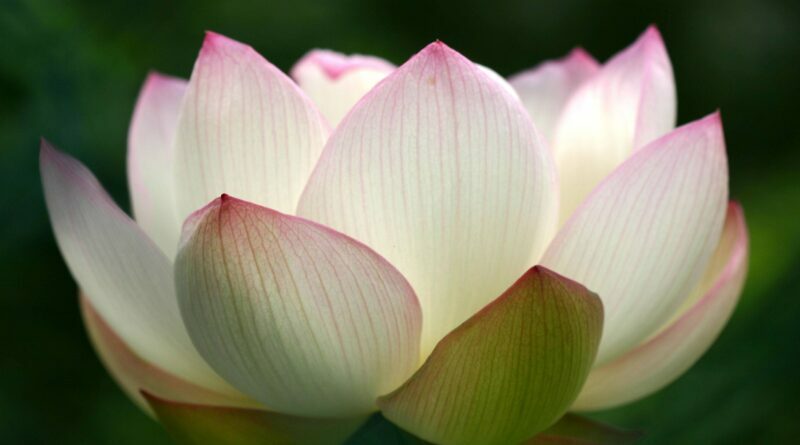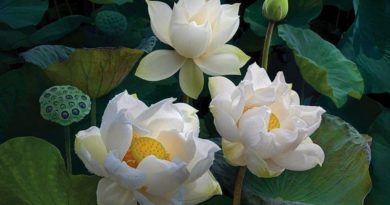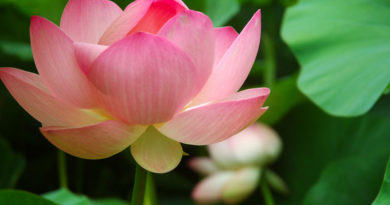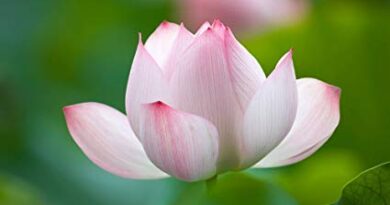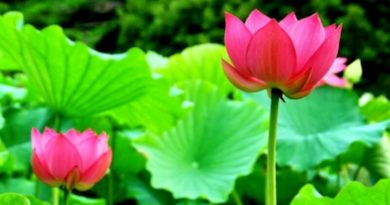DHAMMA RATANA – CHAPTER 7: FIVE SUPPORTING FACTORS
DHAMMA RATANA – CHAPTER 7: FIVE SUPPORTING FACTORS
The Dhamma discourse will be on “Anuggahita Sutta” from Inguttho Pali. Anuggahita=to praise or to support + Sutta=explanation. Vipassana wisdom will be gained when you all practise insight meditation. The most significant thing for you is to support it in order to attain nirvana. Lord Buddha explicated in this Sutta, the five supporting factors for the attainment of nirvana, namely,
(1) Sila
(2) Knowledge
(3) Dhamma Discussion
(4) Samatha meditation
(5) Vipassana meditation
Buddha drew a simile of planting a tree and vipassana wisdom which should be supported by these five factors so as not to be destroyed.
Motto: If you plant a young tree,
water and fence it for security.
To clear rotten old roots and weeds is a sure need
Remove insects and their webs
So that it can grow best
(1) Sila
When you plant a tree you need to fence and water it. Old rotten roots and weeds must be cleared away, so that it can thrive well. Insects on the leaves and branches must be removed and their webs on the branch, leaves and new shoot must be taken away. With the insects eating the leaves and webs entangled the branches and new leaves, tree will not grow well. After the development of vipassana wisdom, it is necessary to fence it with sila. If the tree is unfenced, cattle and other animals can trample the tree. similarly if yogi infringed sila, vipassana wisdom will not progress. With no infringement of sila, there will be progress in vipassana wisdom. No dhamma will be gained, if one committed one of the five heinous actions with immediate destiny (anantarika kamma). Monks as well as laities should observe the four types of sila, namely: Four Types of Sila
(a) Patimokkha samvara Sila – Morality consisting in Restraint with regard to the Disciplinary Code. Worldlings usually observe five precepts, whereas it is eight or nine precepts for the practising yogi. The monks must observe 227 disciplinary codes. Vipassana wisdom will not develop if even five precepts are not observed.
(b) Indriya samvara Sila – Morality consisting of purity of Restraint of senses. Six sense – doors must be restrained, so as lobha, dosa and moha would not arise when a sensual object comes into contact with the sense surface of eye, if pleasant lobha arises and if unpleasant dosa arises. The same way with sound, smell, taste, touch and thought. If these six – sense doors are uncontrolled and with lobha and dosa, vipassana wisdom may not develop. When the fencing around the tree is not strong enough tree can be destroyed, similarly if sila is not strictly observed there may not be a chance for the development of vipassana wisdom.
(c) Azivapari suddha Sila – morality consisting of Restraint with regard to livelihood. Monks are forbidden to accept donations related to fortune-telling and medical care. How ever they are allowed to receive four requisites donated for teaching dhamma scriptures, giving instructions for meditation and how to practise. Worldlings should lead a right livelihood, free from killing, stealing, cheating. etc:- samma-aziva.
(d) Paccaya sannissita Sila – reflection upon using the four requisites. “Alms food is taken not for the enjoyment of pleasure; not to be youthful; not to be strong as a boxer. Nevertheless it is taken to be able, healthy and strong enough to practise dhamma and for the attainment of magga, phala and nirvana without strain and difficulties.” A monk gains merit if he reflect thus while partaking a meal.
For the meditators, while residing at a meditation centre, they should ponder, “This place is quiet and conducive for meditation, thereupon I must try my best to practise meditation.” While taking your meal you should reflect, “We take these varities of food not for beautiful body-built nor for the enjoyment and pleasure but for longevity of aggregates of four elements, as long as we live, so as to practise two branches of Buddha’s Sasana and that the former disease may be cured and the new disease may not arise, and the four bodily postures be comfortable.”
When the four morality conducts are not breached it is certain that vipassana wisdom will develop. Sila is a fence around the vipassana wisdom.
Motto: Sila is likened to the fence around a young tree.
2. Knowledge
You gain knowledge by listening to dhamma talks, reading scriptures and so on. Audition of dhamma is likened to watering a tree. If a tree is regularly watered, it grows and thrives, so also after the audition of dhamma talks, there is progress in meditation. Sometimes yogi may find difficulties in meditation and became depressed after a length of time and wanted to go home. If he did not listen to dhamma talks, he is likely to be more depressed. When a tree is not regularly watered, it withers and dies. Similarly without audition of dhamma and going back home is just like a dead tree.
3. Dhamma Discussion
Discussion of dhamma among the meditators is unbeneficial because it causes laxation in contemplation and slackens the progress in dhamma. It is better to discuss daily with the meditation instructor as guided by Rev: Mahasi Sayadaw.
Motto: Discussion is likened to clearing old rotten roots.
Old rotten roots and weeds around the tree is to be cleared away, so as it may grow well. Similarly, discussion with the meditation instructor is to clear away doubts and difficulties in practice. Sometimes yogi finds problems in noting or his noting is not in compliance with the instructor’s guidance. Sometimes his method of noting may be entirely wrong. At the Paccaya parigghaha Nana Stage, “rising and falling” are so subtle, that yogi could not find the object for noting. Thereupon he tried to breathe hard or might stop breathing. In vipassana meditation breathing should not be over-done or controlled, as a matter of fact, it must be natural. If you do so, you cannot contemplate long and easily get tired. This is entirely incorrect.
In noting rising and falling, there can be many mistakes. For example, in olden days, at a meditation centre in a district, the meditation instructor taught in-breathing as becoming and out-breathing as dissolution. One day a yogi from that centre came to meditate at the Mahasi meditation centre. After a few days, while the meditation teacher was discussing with a yogi, instead of waiting fer his turn, he asked the teacher whether in-breathing was becoming and out-breathing as dissolution. The teacher scolded and stopped him from disturbing. On his turn the teacher enquired who had instructed him to note in such a way and corrected him.
There is both becoming and dissolution in-breathing and also the same in out-breathing. If he did not have the chance to discuss with an instructor, he might not gain dhamma. The instructor has to correct yogi’s wrong way of practice by pointing out that the initial stage of rising is becoming and the end of it is dissolution. Thus discussion is compared to the clearing of old rotten roots and weeds around the tree. Just as the tree, thrives well, so also vipassana wisdom develops in strength.
4. Samatha Meditation
Insects may destroy the tree, likewise lobha, dosa and moha obstruct the progress of vipassana wisdom.
Motto: Samatha is likened to removing the insects.
Four Ways of Protection
Samatha meditation is dhamma to protect our body. In a state, chief of state such as president, prime minister and ministers have soldiers, police and bodyguard for their security as they are indispensable in building the state. Similarly our body should be protected from internal and external enemies, for we gain dhamma i.e. magga, phala and nirvana, by contemplating our body. So it is valuable to us. If we do not contemplate or meditate, our body just like a banana trunk, is of no use for us. There are four ways of protecting our body.
(a) Buddhanussati meditation – reflecting upon the attributes of Buddha
(b) Metta – meditation loving-kindness meditation
(c) Asubha meditation – meditation of impurities of body
(d) Maranasati meditation – reflection of death
(a) Buddhanussati meditation
External enemies may destroy us only for this very life, however the internal enemies endanger us for several existences and can even send us to apaya. For that reason we must protect ourselves from the internal enemies rather than the external one, so as to gain vipassana wisdom and attain magga phala and nirvana. This explanation is in compliance with what Buddha had preached.
Buddhanussati meditation is to reflect upon the at tributes of Buddha. The listeners of dhamma talk and the meditators already have the knowledge of reflecting the Lord’s attributes saying “Arahan”, “Arahan” or Buddha”, “Buddha”, or ‘Sammasam Buddha” “Sammasam Buddha”, repeatedly, are in a way contemplation of Buddha’s attributes. Thus you can dispel moha (delusion) which makes you to perceive wrong as right. Moha is the worst of all nivaranas (hindrances) for it forbids kusala (wholesome) deeds.
On seeing something. being unable to see the true nature, you might develop attachment to the object of sight if it is pleasant. If it is unpleasant dosa arises. On hearing a sound you get angry if it is unpleasant, thereby you develop dosa; if pleasant you develop lobha. Similarly there arises lobha or dosa whenever there is contact of sensual object with the sense-surfaces of eyes, nose, tongue, body and mind. These sight, sound, odour, savour, touch and thought are perceived as wholesome due to moha, although they are sufferings in reality. In other words, these sight, sound, etc: are impermanent or in flux and harass us all the time.
Tanha (craving) a follower of moha makes you to develop attachment to these sight, sound, odour, etc:. There upon you could never be emancipated from the rounds of samsara. Buddha comprehended all truth, therefore by reflecting His attributes you may be able to see the truth. Contemplation of Buddhanussati meditation is the same as protecting your body.
Motto: Ignorance is to be eliminated by contemplation of Buddha’s attributes.
(b) Metta Meditation
According to the stage of insight, a yogi while meditating may get angry. Yogi sometimes reports that she was unsatisfactory and angry for nothing. The reason is that she is at the stage of Sammasana Nana. This anger is regarded as lucidity of insight and sign of progress in dhamma, though yogi may not understand it. She may think that it is a lapse in dhamma. Do not reflect and dwell upon anger as it can obstruct vipassana wisdom. Anger is likened to insects which destroy the young tree. It must be expelled by samatha meditation.
Motto: Dosa is to be eradicated by radiating loving-kindness.
There are two methods of radiating loving-kindness (i) radiating for the development of merit and perfection, (ii) radiating for the attainment of jhana absorption. To radiate for the development of merit is not so difficult as the listeners of dhamma could do it perfectly.
Mental loving-kindness is to radiate loving-kindness mentally for the people you come across or contact with.
Verbal loving-kindness – Experienced yogi tell new meditators, with loving-kindness, how to sit, when to walk, how to walk with down cast eyes, where to walk and not to walk, etc:, so as they may be happy at the meditation centre. If they are unlikely to listen to your helping words you might get angry and they might also be annoyed. Thereupon it is better not to say anything, just leave it to themselves and be indifferent or send them to the persons concerned.
Physical loving-kindness is to radiate loving-kindness by action and behaviour which will make others happy. If young yogi do not accept your help, do not be disturbed and show unwholesome manners, since it can indirectly or directly effect both.
For the development of jhana absorption by radiating loving-kindness it must be done methodically. The proximate enemy of loving-kindness is lobha, whereas distant enemy is dosa and soka (worries and anxieties). While radiating loving-kindness to a person, you may develop attachment to him or her and worry about his or her health i.e. soka.
One who is meditating samatha bhavana for the attainment of jhana absorption should endeavour to be free from these enemies i.e. lobha and dosa. Soka is treated as based upon dosa.
Motto: Opposite sex and dead person,
enemies and indifferent person,
One you loved most,
are the five not to be radiated loving-kindness foremost
How and whom to radiate loving kindness
To whom you should not radiate loving-kindness first and foremost are:- dead persons, opposite sex, most loved ones, indifferent persons and enemies. As you all know, it is unnecessary to radiate loving-kindness to dead person since they could not receive it. It is also not to radiate to opposite sex as raga can arise. If a man radiate loving-kindness to a particular woman, gradually he may develop fondness and love (raga) for her. The same with a woman radiating loving-kindness to a particular man. When you radiate loving-kindness to the most beloved ones, you may develop worries and anxieties (dosa). You ponder “Are they doing well? Is anything wrong with them?” and so on, instead of radiating loving-kindness. Worries and anxieties are enemy of loving-kindness.
When you radiate loving-kindness to those whom you do not love nor hate i.e. you are indifferent to them, the development of loving-kindness will be slow. Radiation of loving-kindness for your enemies may make you angry upon seeing his face in your mental vision. Therefore it is not to radiate these five persons first and foremost.
To whom should you radiate loving-kindness first? Of course, it is you and yourself as Buddha had pointed out, you yourself is the one you loved most. So begin to radiate loving-kindness to yourself first. “May I be free from harm. May I be free from mental suffering. May I be free from physical suffering. Physically and mentally at ease, May I be able to bear the burden of life happily”. By radiating loving-kindness to yourself thus, loving-kindness for others too is developed to certain extent. When you gain jhana absorption radiate loving-kindness to persons whom you should love and who are indifferent to you, neither fond of nor hate. Your enemy should be the last to receive your loving-kindness.
Your already developed jhana absorption could be destroyed if you cannot radiate loving-kindness in this order. There-upon you change to persons whom you should love and then to whom you are indifferent. If not possible, then shift to radiating loving-kindness to yourself and develop jhana absorption. In fact to develop jhana absorption, it is to radiate loving-kindness to yourself, the most loved one. Your loving-kindness is strong when you have well developed jhana absorption, thence you can radiate loving- kindness to any person. Let us try to radiate loving-kindness.
“May I be free from danger, from mental suffering, from physical suffering and be able to bear the burden of life with physical and mental ease.”
You can do so in the same way for those to whom you should love, for those to whom you are indifferent and for your enemies.
There is another way of radiating loving-kindness i.e. to those living in ten direction. Listeners of dhamma have a good knowledge of it. So let us try to radiate for those living in ten directions together, since there is no time to radiate for beings in each directions.
“May all being in the ten directions be free from all danger. May they be free from mental suffering. May they be free from physical suffering. Physically and mentally at ease, may they be able to bear the burden of life happily.”
(c) A-subha meditation
When dosa arises it is to be annihilated by loving kindness meditation, whereas when lobha arises it is to be eradicated by contemplation of impurities of body (a-subha). It is one of the guarding dhammas of body. If you can perceive yourself as asubha, then you also can see otherselves in the same manner.
Motto: Lobha must be expelled by contemplating the impurities of body.
There are two ways of contemplating impurities of body (a-subha). First one is to contemplate the impurities of a corpse; second is to contemplate the impurities of a living body. Contemplation of a-subha on a corpse is no more practised nowadays as the corpses are usually sent to a mortuary. How to contemplate the impurities of a living body is quite clear and easy. First you contemplate your body as A-subha. Whatever excretes from your eyes, nose, mouth and body are impurities. When you get up in the morning you wash your face in order to clean the impurities from eyes, nose and mouth. The whole day you wipe away sweat from the body.
If you see your body as filthy and loathsome, you do not attach to it and no lobha arises. When there is attachment to yourself, you seek various ways and means for your comfort with lobha. Moreover you become attached to yourselves and work with lobha for their happiness and success. If it is a lawful means it is alright: if not you have to face a lot of problems. Therefore, if you can perceive your body as a-subha, lobha is expelled simultaneously.
(d) Maranasati meditation
Self exaltation like “I’m the best”, “I’m the most successful one”, “I’m the most well-to-do”, “If they can do, I could do too”. should be dispelled by recollection of death-maranasati meditation. Seek a secluded place and reflect thus, “Death will come to me”, “death will come to me.” And also by contemplating ‘I’ll be quite happy if I could live for a day: for a night; for half a day: for the
duration of a meal; for the duration of half a meal; for the duration of four or five intakes of food; for the duration of one intake of food, for the duration from an inhalation to an exhalation.
Motto: Mana must be annihilated by recollection of death.
When you are aware that you may die today or tomorrow, conceit and pride will be discarded. It is inevitable, you will never gain dhamma with conceit and pride in your mind. There are many instances to cite. As insects destroy a young tree, so also lobha, dosa, moha and mana (conceit and pride) obstruct the development of vipassana wisdom. That is the reason why these nivaranas (hindrances) must be annihilated by four dhammas protecting the body namely samatha meditation.
5. Vipassana Meditation
Supporting vipassana wisdom by vipassana meditation is analogous to removing webs from the tips of a young tree,
Motto: Vipassana meditation is similar to removal of webs.
When sensual objects likened to the webs which entangled the tips of a young tree, come into contact with the sense-surface of eye, ear, nose, mouth, body and consciousness, there develops aramananussaya (inherent tendency for defilements due to sensual objects). In other words, there develops latent lobha, dosa and moha. When it is a pleasant sensation lobha arises, if it is an unpleasant sensation dosa arises, especially if yogi fails to note. Thereupon no gain of dhamma.
By dint of strong concentration and mature vipassana wisdom. these pleasant or unpleasant sensations arises and disappear simultaneously when yogi contemplate them. For example, on hearing a sound, it is perceived just as a mere sound and no tendency for defilements develops. Upon noting “hearing” “hearing”, each syllable will disappear, so also with smelling and eating, when yogi notes “smelling”. “smelling’, the odour will disappear, on noting “eating”, “eating” yogi will perceive the dissolution of each eating action. By noting thus defilements are dispelled just like removing the webs entangled at the tips of a young tree.
However, attachment to savour is not easily expelled by noting. There are many instances of suffering in apaya, due to the craving for savour. A yogi reported that she could practise general noting at home, after meditating at the centre. Nevertheless she did not note when the food was tasty; she noted if the food was not to her taste and was not aware of the taste. Did she mean that she enjoyed the taste when it was delicious? In that case, she was eating with lobha tanha, instead of contemplating “eating” “eating”. It is to note while eating whether it is tasty or not, just like clearing the webs entangle at the tips of a young tree.
Similarly, it is important to note bodily impression and mental thought whether they are pleasant or unpleasant. Thus contemplation of sensual feelings and thoughts are analogous to removal of webs. When the tree is free from the entanglement of webs, it grows well, similarly when there is no inherent tendency for defilements, vipassana wisdom is strenghtened. Thereupon yogi attains magga, phala and nirvana. Let us conclude the dhamma talk by reciting.
“If you plant a young tree,
Water and fence it for security
Clear rotten old roots and weeds
It is a sure need
Remove insects and their webs
So that it can grow best.”
After listening to this dhamma discourse of “Five Supporting Factors” may you all be able to practise in compliance to the Buddha’s teaching. With diligent contemplation may you all immediately realize your most aspired nirvana, which is free from all sufferings, by practising with ease.

